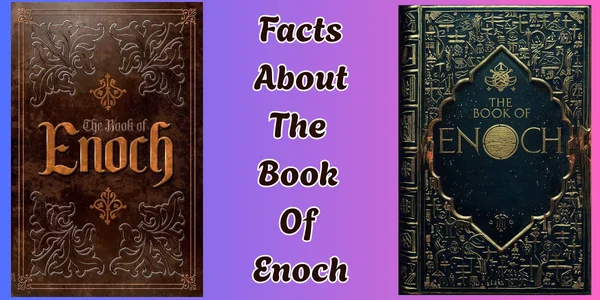The Book of Enoch is one of the most mysterious and controversial ancient texts ever written. Often associated with lost knowledge, fallen angels, and apocalyptic visions, this ancient work has intrigued theologians, historians, and even conspiracy theorists for centuries. Although not included in most modern Bibles, the Book of Enoch has had a profound influence on early Judeo-Christian thought.
Here are 10 captivating facts about the Book of Enoch that shed light on its significance, origins, and the growing interest surrounding it in 2024.
1. The Book of Enoch Is Not in the Bible (But Once Was Revered)

The Book of Enoch is not part of the canonical Bible for most Christian denominations today. However, it was once highly respected by early Jewish and Christian communities. In fact, the book is referenced in several early Christian writings and was considered scripture by early church fathers like Tertullian and Clement of Alexandria.
Interestingly, the Ethiopian Orthodox Church still includes it in its biblical canon.
2. It’s Actually a Collection of Several Books
The “Book of Enoch” is not just one book — it’s a compilation of five major sections:
- The Book of the Watchers
- The Book of Parables (or Similitudes)
- The Astronomical Book
- The Book of Dream Visions
- The Epistle of Enoch
These sections were written at different times and by different authors, yet all are attributed to the biblical figure Enoch, the great-grandfather of Noah.
3. It Explores the Story of Fallen Angels
One of the most compelling parts of Enoch is the Book of the Watchers, which describes angels who descended to Earth, took human wives, and produced a race of giants known as the Nephilim. This tale closely parallels Genesis 6:1–4 but goes into far greater and more dramatic detail.
These angels, called the Watchers, were eventually punished by God for corrupting humanity.
4. It Was Considered Lost for Centuries
The Book of Enoch was lost to most of the Western world for over a thousand years. While early Christian scholars cited it, the complete text disappeared from circulation. It wasn’t until the 18th century that a Scottish explorer, James Bruce, brought a copy back from Ethiopia, where it had been preserved in the Ge’ez language.
It was later translated into English in the 19th century, reigniting scholarly interest.
5. It Influenced the New Testament
Although not canonized, Enoch heavily influenced New Testament authors. For example, Jude 1:14–15 directly quotes from Enoch 1:9. There are also thematic parallels with the Book of Revelation, especially concerning angels, judgment, and heavenly visions.
✝️ Some scholars argue that without Enoch, much of early Christian eschatology wouldn’t make as much sense.
6. It Contains a Complex Astronomical Calendar
The Astronomical Book (or Book of the Heavenly Luminaries) describes a detailed solar calendar and the movements of celestial bodies. It contrasts with the lunar calendar used by many ancient Jewish sects. Some scholars believe the Qumran community (associated with the Dead Sea Scrolls) followed this solar calendar.
This section demonstrates remarkable astronomical awareness for its time.
7. It Survives Largely Thanks to the Ethiopian Church
The most complete version of Enoch exists in Ge’ez, the liturgical language of Ethiopia. To this day, the Ethiopian Orthodox Tewahedo Church considers the Book of Enoch part of its Bible. The preservation of the text in Ethiopia has been crucial to its survival.
️ Ethiopia serves as a living link to one of history’s most enigmatic religious works.
8. Fragments Were Found Among the Dead Sea Scrolls
In 1947, the discovery of the Dead Sea Scrolls at Qumran shocked the academic world. Among the thousands of scroll fragments were several copies of the Book of Enoch in Aramaic, dating back to at least the 2nd century BCE.
This discovery confirmed that the text was widely circulated among Jewish sects before the rise of Christianity.
9. It Offers an Alternative View of Divine Judgment
The Book of Enoch presents a detailed cosmology and vision of divine justice, including heavenly courts, archangels, and the final judgment of both angels and humans. The tone is more mystical and apocalyptic than traditional Jewish texts, and it places heavy emphasis on cosmic order and divine punishment.
⚖️ It provides a bridge between Old Testament prophecy and the vivid apocalyptic visions of Revelation.
10. Modern Scholars and Pop Culture Are Revisiting It
Interest in the Book of Enoch has surged in recent years, especially with the rise of alternative history, ancient aliens theories, and renewed scholarly debate on biblical canons. It’s frequently referenced in documentaries, podcasts, and books exploring forbidden knowledge and lost civilizations.
Shows like Ancient Aliens and The UnXplained have cited Enoch in discussions about extraterrestrial theories and hidden history.
Final Thoughts: A Text Shrouded in Mystery and Meaning
The Book of Enoch is more than just an apocryphal curiosity — it’s a rich tapestry of ancient lore, divine revelation, and cosmic vision. Though left out of mainstream scripture, its impact on Judeo-Christian theology is undeniable. Whether viewed as sacred scripture or ancient myth, Enoch continues to fascinate readers in the 21st century.
If you’ve never explored its pages, now might be the perfect time to dive into this mysterious and powerful book.



